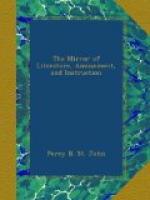WHY ARE NOT THE ENGLISH A MUSICAL PEOPLE?
We cannot help it.—Massinger’s Roman Actor.
Astronomy, music, and architecture, are the floating topics of the day; on the second of these heads we have thrown together a few hints, which may, probably prove entertaining to our readers.
The English are not—you know, reflective public—a musical people; this has been said over and over again in the musical and dramatic critiques of the newspapers. True it is that we have no national music, like our neighbours the Welsh, the Irish, or the Scotch; for our music, like out language, is a mere riccifamento, stolen from every nation in Europe. But our king (God bless him) is an excellent musician, and plays the violoncello most delightfully; and we have an Academy of Music. Then we have an Italian Theatre that burns the feet and fingers of all who meddle with its management—witness, Mr. Ebers, who, by being “married” to sweet sounds, lost the enormous sum of 47,000_l_.—it must be owned, an unfortunate match, or as Dr. Franklin would have said, “paying rather too dear for his whistle.” We have too an English Opera House, where scarcely any but foreign music is heard, and which, to the ever-lasting credit of its management, has transplanted from the warm climes of the south to our ungenial atmosphere, some of the finest compositions in the continental schools of modern music. Success has, however, attended most of their enterprises; for the taste of the English for foreign music is by no means a modern mania. From Pepys’s Diary we learn that the first company of Italian singers came here in the reign of Charles ii.: they were brought by Killigrew from Venice, about 1688; but they did not perform whole operas, only detached scenes in recitative, and not in any public theatre, but in the houses of the nobility. Thus, Italian music was loved and cultivated very early in England, and London was the next capital, after Vienna, which established and supported an Italian Opera. But, as we never do things by halves, we had soon afterwards, two opposition houses. This proves that the English have a taste for music; indeed they have much more judgment than some of their neighbours, which makes it still more to be regretted that nothing is done in England towards the advancement of music as a science. Is the world of sound and the soul of song exhausted? Why should we, who are marching in every other direction, stand still in this? But no; what Orpheus did with music, we are striving to accomplish by steam; what he effected by quietly touching his lyre, we study with the atmospheres and condensers of high and low pressure engines.
The writer of a delightful paper in the Foreign Review, No. 3, in tracing the rise and progress of music, inquires what has become of “its loftier pretensions, its celestial attributes, its moral and political influence.” He then facetiously observes, “How should we marvel to see the Duke of Wellington, like another Epaminondas, take his flute out of his pocket to still the clamour of the opposition, or Mr. Peel reply to the arguments of Mr. Huskisson with an allegro on the fiddle.”




